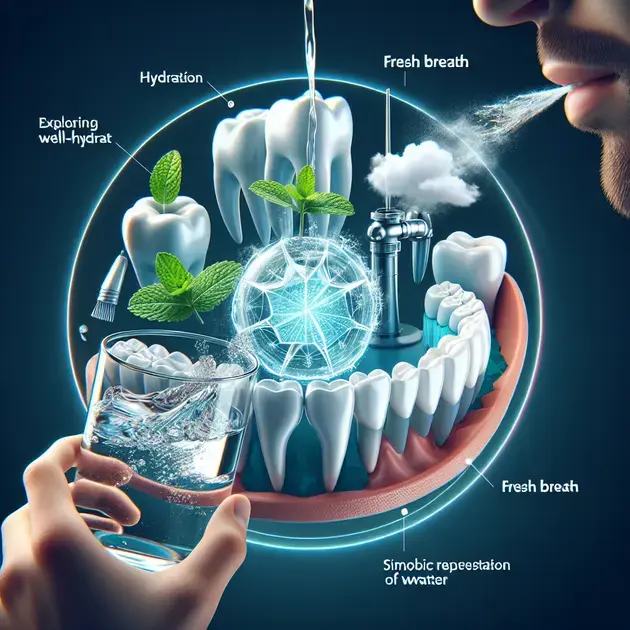Bad breath, also known as halitosis, is a common problem that can cause embarrassment and affect your self-esteem. In this blog post, we will delve into The Root Cause of Bad Breath Explained to help you understand why it happens and how you can address it effectively.
Recent studies have shown that the primary cause of bad breath is the buildup of bacteria in the mouth. These bacteria release sulfur compounds that create an unpleasant odor. By targeting the root cause of bad breath, you can take proactive steps to improve your oral hygiene and freshen your breath.
Understanding the Science Behind Bad Breath
Bad breath, also known as halitosis, can be caused by various factors such as diet, poor oral hygiene, and underlying health conditions. However, the main culprit behind bad breath is the presence of bacteria in the mouth. These bacteria release sulfur compounds that create the unpleasant odor associated with bad breath.
To understand the science behind bad breath, it’s important to know that our mouths naturally harbor bacteria. When we consume food, especially those high in sugars and proteins, these bacteria break down the food particles and release volatile sulfur compounds (VSCs) as byproducts. These VSCs are what give bad breath its characteristic foul smell.
One way to measure the level of VSCs in your mouth is through a device called a sulfide monitor. This tool can detect the presence of these sulfur compounds and indicate the intensity of bad breath. By understanding the role of bacteria and VSCs in causing bad breath, we can better address the issue and find effective solutions.
Proactive Solutions for Fresher Breath
Now that we know bacteria play a key role in causing bad breath, it’s essential to take proactive steps to maintain fresh breath. One effective solution is to practice good oral hygiene, including brushing your teeth twice a day and flossing regularly. Using a tongue scraper can also help remove bacteria from the surface of the tongue, reducing the chances of bad breath.
In addition to oral hygiene practices, incorporating probiotics into your diet can also help improve the balance of good and bad bacteria in your mouth. Probiotic supplements or foods like yogurt and kefir contain beneficial bacteria that can compete with the odor-producing bacteria, ultimately promoting fresher breath.
Another proactive solution is to stay hydrated throughout the day. Drinking plenty of water helps wash away food particles and bacteria in the mouth, reducing the risk of bad breath. Avoiding tobacco products and maintaining a balanced diet can further contribute to fresher breath.
Addressing Persistent Halitosis
Bad breath, also known as halitosis, can be a persistent and embarrassing problem for many individuals. It can be caused by various factors, including poor oral hygiene, certain foods, underlying health conditions, and lifestyle habits. Addressing persistent halitosis requires a comprehensive approach that targets the root cause of the issue.
One of the primary steps in addressing persistent halitosis is maintaining good oral hygiene practices. This includes brushing your teeth at least twice a day, flossing daily, and using mouthwash to kill bacteria. Regular visits to the dentist for professional cleanings and check-ups are also essential in preventing and addressing bad breath.
Another important aspect of addressing persistent halitosis is identifying and addressing any underlying dental issues. Gum disease, tooth decay, and oral infections can contribute to bad breath. Treating these conditions with the help of a dental professional is crucial in eliminating halitosis.
Diet can also play a significant role in causing bad breath. Certain foods, such as garlic, onions, and spicy foods, can contribute to an unpleasant odor in the mouth. Limiting the consumption of these foods and staying hydrated by drinking plenty of water can help reduce the likelihood of halitosis.
In some cases, persistent bad breath may be a sign of a more serious underlying health condition, such as respiratory infections, diabetes, or liver disease. If bad breath persists despite practicing good oral hygiene habits, it is important to consult with a healthcare provider to rule out any underlying medical issues.
Exploring Hydration’s Impact on Oral Odor
Hydration plays a crucial role in maintaining oral health and preventing oral odor. Dehydration can lead to a dry mouth, which in turn can contribute to bad breath. Exploring the impact of hydration on oral odor involves understanding the importance of drinking an adequate amount of water throughout the day.
When the mouth is not properly hydrated, bacteria that cause bad breath can thrive and multiply. Drinking water helps wash away food particles and bacteria in the mouth, reducing the risk of halitosis. Additionally, staying hydrated promotes saliva production, which is essential for maintaining a healthy mouth and neutralizing acids that can cause odor.
Incorporating hydrating foods and beverages into your diet can also help combat oral odor. Fruits and vegetables with high water content, such as watermelon, cucumber, and celery, can help keep the mouth hydrated and fresh. Avoiding excessive consumption of dehydrating beverages like alcohol and caffeine is also important for oral health.
Establishing a hydration routine that includes drinking water throughout the day, especially after meals, can aid in combating oral odor. Keeping a water bottle handy and setting reminders to drink water can help ensure that you stay adequately hydrated and maintain fresh breath.
Overall, exploring the impact of hydration on oral odor highlights the importance of staying hydrated for good oral health. By incorporating hydration into your daily routine and being mindful of your fluid intake, you can help prevent dry mouth and reduce the risk of developing bad breath.
Implementing Effective Oral Hygiene Practices
Effective oral hygiene practices are essential for maintaining a healthy mouth and preventing oral odor. Implementing a consistent oral care routine can help keep your breath fresh and prevent dental issues such as cavities and gum disease. Understanding the key components of effective oral hygiene is crucial for optimal oral health.
Brushing your teeth at least twice a day with fluoride toothpaste is a fundamental aspect of effective oral hygiene. Use a soft-bristled toothbrush and brush in gentle, circular motions to remove plaque and bacteria from the surfaces of your teeth. Be sure to also brush your tongue to remove bacteria and freshen your breath.
Flossing daily is another important component of effective oral hygiene. Flossing helps remove food particles and plaque from between the teeth and along the gumline, where toothbrush bristles may not reach. Incorporating flossing into your daily routine can significantly reduce the risk of bad breath and gum disease.
Using an antibacterial mouthwash can complement your oral hygiene routine by killing bacteria that can cause bad breath. Choose a mouthwash that contains antibacterial ingredients and use it after brushing and flossing for an extra dose of oral hygiene protection. Mouthwash can also help freshen your breath throughout the day.
In addition to regular brushing, flossing, and mouthwash use, scheduling routine dental cleanings and check-ups is essential for maintaining optimal oral health. A dental professional can remove stubborn plaque and tartar buildup, identify early signs of dental issues, and provide personalized recommendations for improving your oral hygiene routine.
Conclusion
In conclusion, addressing persistent halitosis requires a multi-faceted approach that encompasses good oral hygiene practices, addressing underlying dental issues, watching your diet, and seeking professional help if needed. Maintaining a consistent routine of brushing your teeth, flossing daily, and using mouthwash can significantly aid in combating bad breath.
Moreover, understanding the impact of hydration on oral odor is crucial. Staying adequately hydrated by drinking water throughout the day helps prevent dry mouth, promotes saliva production, and washes away bacteria that cause halitosis. Including hydrating foods in your diet and avoiding dehydrating beverages further contribute to keeping your breath fresh.
Lastly, implementing effective oral hygiene practices is paramount for optimal oral health and preventing oral odor. Brushing your teeth with fluoride toothpaste, flossing daily, and using antibacterial mouthwash are essential components. Regular dental cleanings and check-ups play a vital role in maintaining overall oral health and addressing any potential issues early on.

